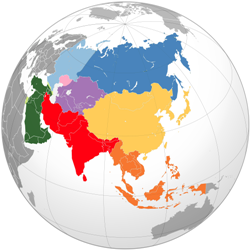A Review of Online Gambling in Asia (Part II)

Continuing on from Part I, here is the concluding article dealing with the current state of online gambling in Asia, a huge continent of 4.43 billion people.
Singapore
Gambling is completely illegal in Singapore, and hundreds of sites located outside the country have been blocked by the Singaporean government. The country’s Remote Gambling Act does allow local nonprofits to participate in online gambling like drawings or raffles. Players and proprietors that break the law can face very stringent penalties.
South Korea
In South Korea, it’s illegal for a citizen to gamble even when traveling abroad, but in recent years, casinos have opened. Only one of these, the Kangwon Land Resort & Casino, is legal for South Koreans to visit. South Koreans are known to play on international sites, but difficulties transferring money do prevent many people from accessing the games.
Taiwan
In Taiwan, sports betting with the Taiwan Sports Lottery is permitted, but the odds are less than favorable. As a result, the Taiwanese generally prefer online gaming sites for casino games, sports betting, Mahjong and Chinese chess. Illegal online gaming sites are not uncommon but operators and players face harsh penalties if caught by authorities. Using third-party pay services, some Taiwanese players use international sites, but this practice is not permitted under the laws of Taiwan.
Thailand
In Thailand, only horse racing in Bangkok and the Thai lottery are legal forms of gambling. However, Thai citizens who want to gamble freely use international sites to participate in online poker and casino games, and the authorities do not seem to be concerned with stopping these activities.
Vietnam
Both online and offline gambling outside of the state-run lottery are illegal in Vietnam. Those who are found to violate Vietnamese law are faced with very steep fines, yet Vietnamese citizens still participate in online gambling at poker, sports betting and casino sites located outside of Vietnam.
India
Gambling is restricted on the Indian subcontinent, with just horse racing and lotteries fully legal. However, the increase in its middle class, together with the continuing spread of the internet access in India has contributed to a consistent increase in its online gambling market. Nevertheless, online gambling continues to be a grey area, and although the Indian government does not issue iGaming licenses, there does not appear to be any specific laws explicitly forbidding online gambling. The two exceptions are the states of Maharashtra, which has banned online gambling completely, and the state of Sikkim, which reserves the right to give out licenses to operators.
Islamic Countries With Gambling Bans
In the canonical narrative of the Sunan Abu Dawud, the Prophet Muhammad was quoted as saying that “Wagers are allowed only for racing camels or horses, or shooting arrows.” Nevertheless, this is seen as providing encouragement for early Muslims to be fighting-fit, and in general gambling, like alcohol, is usually considered ‘haram’ by scholars and are outlawed in most Muslim countries. Typical punishment for gambling includes 12 lashes, up to a year in prison, as well as monetary fines. The following is a list of Islamic countries where all types of gambling are banned:
Bahrain
Bangladesh
Brunei
Kuwait
Pakistan
Qatar
UAE
Prospects Looking Ahead
Asia presents one of the most lucrative opportunities for online operators, with more and more people turning from land-based casinos to the online realm. As a result, online gambling companies have started pivoting more towards the Asian market, such as PokerStars, with the main markets of China, Japan or Korea seen as especially important. Being such a huge market, it is easy to become overwhelmed by the disparate online gambling landscape, but it is still possible to simplify the whole picture.
On the one hand, Muslim countries continue to ban gambling activities based upon religious beliefs, while at the other extreme countries such as Macau and Philippines are considered “gambling havens” and adopt a welcoming attitude towards the gambling industry. Between these two extremities, there are a large number of countries which have forbidden gambling, but take few steps to prevent these activities, such as Malaysia or Thailand. Given the overall picture, and the constant advances being made in the technological arena contributing to an expanding iGaming market, it is fair to expect more countries to adopt online gambling regulation in the future.









